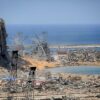
Lebanon’s economic crisis is being compounded by political stalemate, corruption and Western interference, while Hezbollah’s political position has weakened because of a flailing relationship with its Christian ally, writes As’ad AbuKhalil.
We will never be given any solid evidence for these U.S. spy claims, writes Caitlin Johnstone. Yet U.S. foreign policy officials and mainstream news coverage of them will act as though we have.